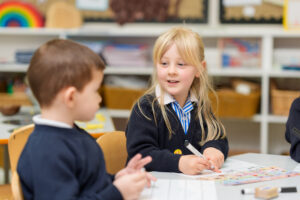‘Anyone can make a difference…’
Ms D Corkery, Head of Religious Education, here tells us of the research that Lower VI have been undertaking recently:
‘As part of their studies in Catholic Social Teaching in Core RE, Lower VI students have been researching the topic “Anyone can make a difference: 21st century changemakers.” The students were asked to reflect upon the following: “Who in the world today is doing something about inequality, injustice, exclusion and environmental degradation? What can they teach us? How can we draw on our own faith and personal experience to be changemakers?” They then researched a ‘changemaker’ of their choice and presented their findings in the form of a newspaper article. Here’s an example of the quality of work from Chloe in Lower VI.’
The Plastic Crisis: A Solution?
Plastic. We use it every day. Plastic bags, plastic cups, plastic containers. We have recycling bins dedicated to them, yet only 9% of the plastic we use ends up being recycled. By 2050, it is estimated that there will be more plastic in the sea than fish – and it will take five hundred to five thousand years for a single plastic item to fully break down. But, despite these statistics, we use plastic every day. It is cheap, light and durable. It is easy to mass produce and is the most convenient type of container. Any alternative option is always much more expensive and many people cannot afford to make the switch. So how do we combat this crisis?
In 2018, a young biology student from Reed College, Oregon, may have found the solution. Bacteria. Morgan Vague isolated three bacteria eating plastics which eat polyethylene terephthalates (PET) – the most common type of plastic, amounting to 20% of all plastics made each year.
During her senior year of college, Vague was interested in the ability of bacteria to come up with food sources. It is currently estimated that there are over 5 trillion trillion bacteria on the planet, all of which need food sources. Vague used this information and theorised that areas high in petroleum pollution may house bacteria which have evolved to eat it. She took three hundred samples of sand, soil and water refineries near Houston, Texas and proceeded with her experiments.
For bacteria to be successful, they would have to break down the plastic into a lipase material. Of the three hundred samples, only twenty were successfully able to break down plastic. Vague focused on the top three lipase producing bacteria – one of which was an unknown strain and so she named it Pseudomonas morgenensis.
Vague understands that her findings are not a cure-all. However, reducing, reusing and recycling are not enough to combat this plastic problem – and so bacteria will be able to give us a hand in the way in which we need it most.
Morgan Vague has shown us that no matter your age or occupation, no matter if you are a world-renowned scientist or a student with some hopeful aspirations, you can always make a change in this world. Additionally, her discovery was so incredible that Times Magazine did a feature of her so that her accomplishment could reach a variety of audiences in the hopes to inspire.
I myself am a Catholic girl with aspirations to be part of the STEM world. The STEM industry is a very male dominated industry. However, in more recent years, women have started to overcome the boundaries set for them in the scientific community. Morgan Vague is just one of the few women who have been able to show the world that as a woman, she is just as capable as a man. So much so that her discovery will be in history books.
Furthermore, Vague found a potential solution to the plastic crisis by using what was already provided by the world. The Catholic Church teaches that God provides for us all we need. That “God will fully supply your every need according to his glorious riches” (Philippians 4:19). God has made it so that the world evolves with us so that it provides solutions to current issues, not just the ones that were present in the world two thousand years ago, and this is aided by science. Without science we would not be able to understand the world we live in and how we can use what has been provided to us to solve current problems.
Morgan Vague is a changemaker. She is changing the world. She is demonstrating to everyone in the world that there is always a solution, you might just have to look incredibly closely.





